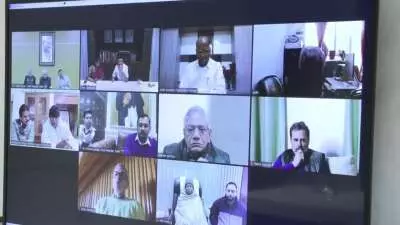Weakened by fissures

In a virtual meeting of the Indian National Developmental Inclusive Alliance (INDIA), Congress president Mallikarjun Kharge emerged as the consensus choice for the chairperson position of the bloc. At the same time, the name of Bihar CM Nitish Kumar was proposed for the Convenor’s post which he did not immediately accept. Terming the discussions to be “fruitful”, Kharge confirmed that “everyone is happy that the seat sharing talks are progressing in a positive way.” Later on, other leaders of the bloc also expressed their optimism around the unity of the bloc. However, understandably, the equations within the bloc may not be as cosy as it is being presented. First and foremost, the reason behind Nitish Kumar’s decision to not readily accept the offer of Convenor’s post is ambiguous. Several theories are afloat to explain his stand. Nevertheless, his decision might turn out to be a favourable one for the stability of the bloc. Kharge, as a representative from the pivotal Indian National Congress (INC), enjoys a unanimous support, but the same cannot be said about Nitish Kumar who is a regional leader and one of the several state heads eying for the PM’s post. It is probable that the decision to give Nitish Kumar the Convenor’s post may be contested by prominent INDIA bloc leaders who could not participate due to some reasons. In fact, Mamata Banerjee, who cited short notice of the invitation as the reason behind her absence, is learnt to have opposed Kumar’s name for the Convenor’s post. Shiv Sena (UBT) leader Uddhav Thackeray and Samajwadi Party chief Akhilesh Yadav were also not able to attend the meeting. Thackeray clarified that there “shouldn’t be any misunderstanding in this regard”, adding that he could not attend the meeting as he “had to attend a scheduled programme which involved a lot of moving around.” In absence of the participation of such crucial leaders, it is only conducive for the bloc that Nitish Kumar did not accept the position readily. It is important that all leaders are taken on board before making significant decisions. Their absence also underscores the necessity to plan the INDIA meetings in a more organised and consultative manner. Additionally, the fissures among certain INDIA bloc parties and leaders are evidently clear even as the General Elections are inching closer. Though it did not make for headlines, the reservations and apprehensions were clearly stated during the latest INDIA meeting. The fault lines between the Congress and the AAP in Delhi and Punjab are more visible than ever. Delhi CM Arvind Kejriwal highlighted that Congress leaders were publicly criticising the AAP even when the two parties were engaged in seat-sharing for the Lok Sabha election. He also pointed out the inaccessibility of the Congress high command. The INC is also at loggerheads with the TMC government in West Bengal where a Congress leader recently called for dismissal of the TMC government amid ED raids. Additionally, the state leadership of the INC is also ruffling feathers with Shiv Sena (UBT) in Maharashtra. Communist Party of India general secretary D Raja emphasised the importance of including the Left parties in discussions about seat-sharing. He warned against allowing disparities among INDIA constituents to play into the hands of the BJP in West Bengal and Kerala. Regrettably, the central leadership of the INC did not have convincing and practically coherent answers to such apprehensions raised during the INDIA meeting. Evidently, the INDIA bloc is struggling to keep its nuts and bolts together, with even the functional components of the alliance, like seat-sharing and dispute resolution, lingering in the realm of vulnerable uncertainty. What is required, alternatively, is a united front ready with a comprehensive agenda with a strong counter-narrative — something that is not in sight currently. If the bloc is finding it hard to keep the leaders of different parties together, it is inconceivable how it will persuade voters to vote across party lines in support of INDIA! While a formidable Opposition is a vital prerequisite for a functioning democracy, it remains a fact that the Opposition itself has been pushed back to adopt a defensive stance.



